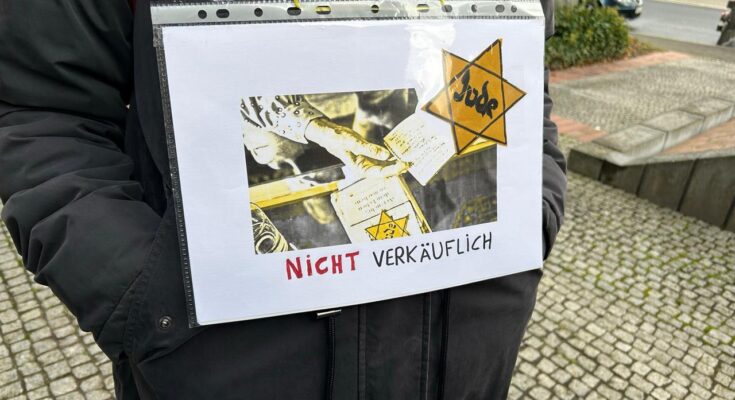An auction house in North Rhine-Westphalia has canceled an auction of Nazi documents. There was international criticism.
Source: ZDF/Dorothée Esther Schmidt
Under the motto “Human dignity cannot be auctioned off,” dozens of demonstrators gathered on Monday in front of an auction house in Neuss, North Rhine-Westphalia. Initially, hundreds of pieces of Holocaust evidence from the collections of private Nazi researchers will be auctioned in an online auction.
Concentration camp liberation certificates and propaganda posters were sold
This surprised many people here. “Who hangs a used Star of David in his living room and why?” protester Helga asked, referring to the so-called “Jewish stars” that Jews had to wear on their clothing during the Nazi era.
On Monday, internet archives still contained what had disappeared from the auction house’s website: for example, a certificate of liberation from a concentration camp for 400 euros, a “Judenstern” for 350 euros, or an anti-Jewish propaganda poster for 600 euros.
The Auschwitz Memorial shows the enormity of the mass murder of National Socialists. Almost all visitors felt the same way: the more they looked, the quieter they became.
01/27/2025 | 4:07 min
The auction in Neuss caused international criticism
The auction also sparked international criticism. The International Auschwitz Committee described it as a “cynical and shameless enterprise.” The Fritz Bauer Institute criticized the documents for being advertised without considering the personal rights of the persecuted person and the interests of descendants who are entitled to protection.
Polish Foreign Minister Radosław Sikorski spoke about the scandal and requested talks with Federal Minister of Foreign Affairs Johann Wadephul (CDU). According to the German Press Agency, he stressed an “ethical obligation” towards victims to “prevent such things.”
“The memory of Holocaust victims is not a commodity and cannot be traded commercially,” Sikorski wrote in X. Poland is committed to returning the artifacts to the Auschwitz Museum.
When his father and sister were deported, his mother took him to safety. Jack Offen grew up sheltered and did not consider himself a survivor. Until he talks about his life.
May 8, 2025
Where to put exhibits?
After discussions with the Polish Embassy, the Ministry of Foreign Affairs and the Jewish community in Düsseldorf, the head of the State Chancellery of North Rhine-Westphalia, Nathanael Liminski, requested talks with the auction house.
In the telephone call he was informed by the auction house leader that the auction had been cancelled. A spokesperson for the Chancellor of the Exchequer confirmed this to ZDF on Monday.
Auctioning off World War II relics is not unusual. The Hermann Historica auction house of Munich, for example, offers many belts or badges with SS symbols or swastikas. The purchaser must confirm with the click of a mouse that he or she wishes to use the purchase to educate citizens, to counter unconstitutional efforts, or to report on historical events. Many people interested in these items from the Second World War appear to live abroad.
There is no law that expressly regulates such auctions. However, the auctioneers’ association agreed: If a sale is deemed immoral or violates personal rights after a post-mortem, the auctioneer may not take action out of decency.
Rupert Keim of the Federal Association of German Art Auctioneers also pointed out to ZDF the possibility of consigning or selling objects from the Second World War directly to public institutions, documentation centers or memorial sites.
Now the most important thing is to find the right way to handle the exhibition. “One idea is to allow memorial agencies and foundations to obtain the documents,” he continued. Liminski is still in contact with the auction house, the minister’s spokesperson told ZDF.
I am confident that a solution can be found to meet the concerns of the Polish side and the Jewish community.
Nathanael Liminski, Chief Chancellor of the State of North Rhine-Westphalia
The Federal Government’s Minister of State for Culture, Wolfram Weimer, also welcomed the cancellation of the ZDF auction. Letters or postcards from persecuted and murdered Jews are not allowed to be auctioned like everyday items, a spokesman said. Documents or reports of Nazi criminals are not for private collections.
Contemporary historical documents of these sufferings and crimes are well preserved in memorials, museums, and research institutions.
Wolfram Weimer, Minister of State for Culture
Twelve percent of 18 to 29 year olds in Germany have never heard of the Holocaust. Greg Schneider of the Jewish Claims Conference explains why this is the case.
September 19, 2025 | 0:45 min
Experts and journalists arrived from Israel
In front of the auction house, protesters demanded that the origins of the objects be revealed and that they be handed over to a place that respectfully upholds the memory of the Holocaust and the fate of those persecuted. An Israeli television station also came forward to report. Many people are very upset about the commercial aspect of an auction.
“There was a letter sent by someone who was in prison to his relatives. And people are getting excited about this,” said activist Rosa Maria Bianco.
Also present at the location were David and Shimon Sabag, from the Yad Ezer L’Haver Holocaust Museum in Haifa, Israel. They want to bring the testimony of the Holocaust to Israel. “We believe these items should fall into the right hands and not be sold and turned into a business,” David Sabag said.
On Holocaust Remembrance Day, the victims of the German atrocity at Auschwitz are remembered with a “March of the Living,” led by the presidents of Poland and Israel.
April 24, 2025 | 2:03 min
Their concerns were supported by a letter from a member of the Knesset, Israel’s parliament, who is the grandson of a Holocaust survivor.
However, small groups in front of the house were not allowed into the building, and there were no discussions with auction house representatives on Monday. However, David Sabag and Shimon Sabag did not want to leave Germany until they completed their mission. Protesters are calling for laws banning the trade in personal documents belonging to people persecuted by the Nazis – so that individuals in particular can no longer bid.
Source: dpa, ZDF



